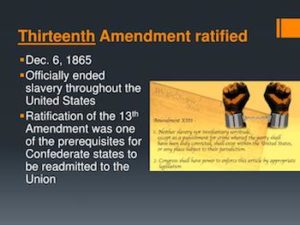
The 13th Amendment to the Constitution of the United States was ratified on this date in 1865.
"Neither slavery nor involuntary servitude" shall exist in the United States. It gave Congress the power to enforce this article by legislation. This Amendment had been preceded by a federal restriction on the importation of slaves in 1808, the Emancipation Proclamation of 1863, and legislative bans against slavery in many states before 1865. but the 13th Amendment was the first unconditional constitutional action to terminate the institution of slavery and the first of the amendments to protect the equal status of Black people (others are the 14th, 15th, and 24th amendments).
The Thirty-eighth Congress proposed the 13th Amendment to the Constitution of the United States to the legislatures of several states on January 31, 1865. In a proclamation dated December 18, 1865, the Secretary of State declared that it had been ratified by the legislatures of 27 of the 36 states.
The dates of ratification were: Illinois, February 1, 1865; Rhode Island, February 2, 1865; Michigan, February 2, 1865; Maryland, February 3, 1865; New York, February 3, 1865; Pennsylvania, February 3, 1865; West Virginia, February 3, 1865; Missouri, February 6, 1865; Maine, February 7, 1865; Kansas, February 7, 1865; Massachusetts, February 7, 1865; Virginia, February 9, 1865; Ohio, February 10, 1865; Indiana, February 13, 1865; Nevada, February 16, 1865; Louisiana, February 17, 1865; Minnesota, February 23, 1865; Wisconsin, February 24, 1865; Vermont, March 9, 1865; Tennessee, April 7, 1865; Arkansas, April 14, 1865; Connecticut, May 4, 1865; New Hampshire, July 1, 1865; South Carolina, November 13, 1865; Alabama, December 2, 1865; North Carolina, December 4, 1865; Georgia, December 6, 1865.
Ratification was completed on December 6, 1865. Oregon next ratified the Amendment on December 8, 1865; California on December 19, 1865; Florida, December 28, 1865 (Florida again ratified on June 9, 1868, upon its adoption of a new constitution); Iowa, January 15, 1866; New Jersey, January 23, 1866 (after having rejected the Amendment on March 16, 1865); Texas, February 18, 1870; Delaware, February 12, 1901 (after having rejected the Amendment on February 8, 1865); Kentucky, March 18, 1976 (after having rejected it on February 24, 1865). Mississippi rejected the Amendment on December 4, 1865.
The 13th Amendment has been interpreted by the Supreme Court to include the prohibition of public or private racial discrimination in the disposal of property, in making and enforcing contracts, and in private employment. Although directed explicitly against slavery, the ban against involuntary servitude (“except as a punishment for crime”) has been viewed by the federal courts as applicable to other conditions of forced labor.
Historic U.S. Cases, 1690-1993:
An Encyclopedia New York
Copyright 1992 Garland Publishing, New York
ISBN 0-8240-4430-4